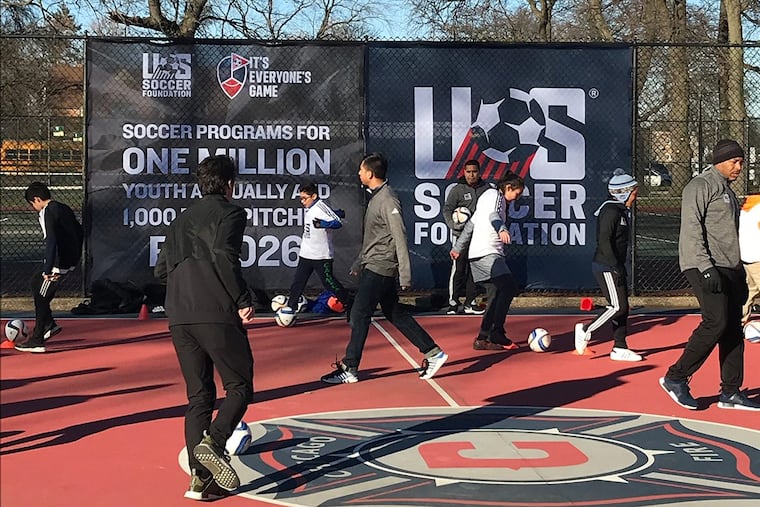How to make soccer accessible to more kids? One group looks to pickup basketball.
As president and chief executive of the U.S. Soccer Foundation, Ed Foster-Simeon is applying the lessons of street basketball to soccer.

Growing up in New York, first in Brooklyn and then North Babylon, Ed Foster-Simeon played basketball whenever he wanted. There were courts in his Bushwick neighborhood and courts at the Long Island schoolyards.
Friends got together and played pickup games for hours, learning and loving the game through boyhood experiences. There was nothing formal about it: Kids developed their own style, chemistry and nuance without adult supervision.
"I didn't see a coach until I was in eighth grade," he recalled in an interview this week.
Decades later, as president and chief executive of the U.S. Soccer Foundation, Foster-Simeon is applying the lessons of street basketball to soccer. On Wednesday, he will join Chicago Mayor Rahm Emanuel and former U.S. men's and women's national team players in announcing plans to build 50 mini-pitches over three years in the city's underserved neighborhoods.
Mini-pitches are outdoor hard surfaces, the size of a tennis court, where small-sided matches foster technical skill and creativity – not unlike pickup basketball in parks and schools around the country. By making mini-pitches accessible to children who otherwise do not have the opportunity or resources to play regularly, Foster-Simeon said, the number of players is sure to swell.
"Growing up with basketball, no one had to tell us to compete," he said. "You didn't want to lose; you wanted to stay on the court. We think that same soccer culture exists here in this country. It's just creating the access and opportunity."
The issue of expanding opportunity and developing players comes at a time when the U.S. soccer community, stung by the failure of the men's national team to qualify for the World Cup this fall, is seeking ways to reach youths, particularly in minority communities, who have slipped through the cracks. Furthermore, many blame costly club programs for marginalizing hopeful players.
"Pay to play doesn't work for them," Foster-Simeon said. "Neither does the idea of, 'Let's get in the minivan and go to the soccer complex for practice.' It doesn't work for a large number of children. So creating opportunities in the neighborhood where kids live and creating a safe place for them to play, we think solves a number of problems. By eliminating the cost barrier, kids are getting introduced to the game, having a chance to play and developing a love for it.
"Some of those kids will be good – there's no question, just by the law of averages."
The effort began with a public-private partnership in New York – 10 mini-pitches opened in October, with 40 more on the way – and will turn to places such as Philadelphia and Los Angeles in the future. The goal is to build 1,000 nationwide by 2026.
The Washington-based U.S. Soccer Foundation – not to be confused with the sport's governing body, the Chicago-based U.S. Soccer Federation – was founded in 1994 with the $50 million surplus from the World Cup hosted by the United States that summer. The nonprofit's mission is to grow the sport through grants to communities and soccer organizations, but also by establishing sports-based youth initiatives, particularly in neglected areas.
The latest mini-pitch project gained support from the Kenneth C. Griffin Charitable Fund, which gifted $3 million. Each pitch costs $60,000 and takes about three weeks to build. The Chicago effort will begin in earnest when the weather breaks in the spring.
Wednesday's ceremony will include, among others, former U.S. stars Brian McBride and Kristine Lilly. The project has enlisted the Chicago Park District and MLS's Chicago Fire.
"These new soccer pitches will give young people across Chicago state-of-the-art places to play and learn one of the world's most exciting and popular games," Emanuel said in a written statement. "This partnership provides a great opportunity for our youth to stay active, and gain teamwork and leadership skills that will serve them on and off the field throughout their lives."
Germany identified the benefits of mini-pitches after it hosted the 2006 World Cup, building more than 1,000 around the country.
In recent years, MLS teams have been involved in mini-pitch openings.
The U.S. foundation's Soccer for Success, an after-school program, uses the outdoor spaces to further introduce the game to children.
And in their free time, those same kids just might return for pickup soccer.
"I wouldn't underestimate the value of getting kids playing soccer in that kind of format," Foster-Simeon said of playground facilities. "The tight spaces on the mini-pitch, their skill development will naturally develop. It has to – or you lose the ball."